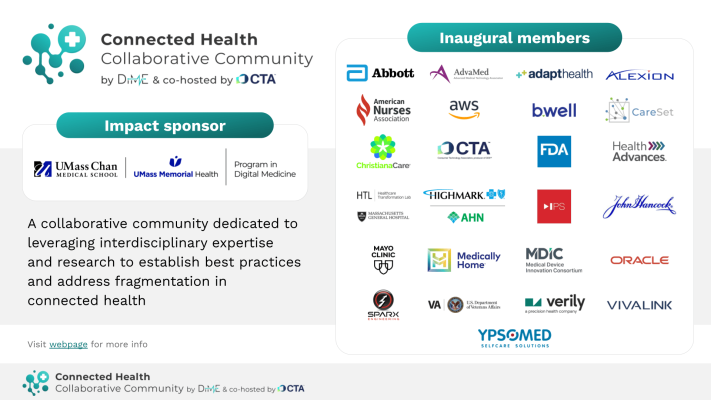
Redefining healthcare delivery for patients and communities with the Connected Health Collaborative Community
Imagine a world where hospital-level care is delivered in the comfort of a patient’s home—offering convenience, faster recovery, lower costs, and better outcomes. During the COVID-19 pandemic, this vision came to life through the Centers for Medicare & Medicaid Services (CMS) Acute Hospital Care at Home (AHCAH) program. Launched in November 2020, AHCAH empowered hospitals to provide acute care at home, easing the strain on overburdened systems while keeping patients safe from hospital-acquired risks. For patients managing chronic conditions or recovering from illness or surgery, staying at home wasn’t just a new option—it was a transformative experience, proving that home-based care could enhance both quality of care and quality of life.
Uniting the industry through the Connected Health Collaborative Community
The healthcare landscape is transforming, and the Connected Health Collaborative Community (CHcc) is at the forefront of this change. Co-hosted by the Digital Medicine Society (DiMe) and the Consumer Technology Association (CTA) with UMass Chan Medical School’s Program in Digital Medicine as the founding Impact Sponsor, CHcc represents a bold step toward unifying industry stakeholders to tackle fragmentation in connected health. This initiative is rooted in a shared commitment to redesign healthcare delivery, making it more equitable, effective, and patient-centered.
CHcc’s inaugural project, Advancing a Sustainable Hospital-at-Home Ecosystem at Scale, embodies this mission. This project brings together a diverse coalition of industry leaders—including major health systems, technology providers, and advocacy organizations—to unlock the potential of the hospital-at-home model. Together, we are identifying how digital technologies can enable scalable and sustainable solutions that benefit patients and healthcare systems.
What makes this initiative particularly compelling is its potential to address some of the most pressing challenges in healthcare. By leveraging real-world data, interdisciplinary collaboration, and open-access resources, the project is setting the stage for a more cohesive, connected healthcare ecosystem. This effort isn’t just about deploying technology; it’s about reimagining healthcare delivery to meet people where they are—in their homes, supported by innovative solutions that ensure quality and accessibility.
Reimagining hospital-level care in the home
Hospital-at-home offers a transformative approach to various acute and chronic conditions, providing patients with safe, effective care in the comfort of their own homes. For example, chronic obstructive pulmonary disease (COPD) affects millions of individuals worldwide, posing unique challenges to both patients and healthcare systems. Managing acute exacerbations often requires hospitalization, but traditional inpatient care can be costly, disruptive, and stressful for patients and their families.
A hospital-at-home model provides a promising alternative to hospitalization. It addresses these challenges while offering comfort, convenience, and better outcomes. When a COPD patient experiences an acute exacerbation, they may enroll in a hospital-at-home program.
This model provides the necessary medical treatment and monitoring directly in the patient’s home, reducing the need for inpatient care. A dedicated care team—including doctors, nurses, and respiratory therapists—works closely with the patient, providing regular home visits to monitor vital signs like oxygen saturation, adjust medications, and manage therapies. Between visits, digital tools enable continuous monitoring and allow patients to access real-time support if their symptoms change.
This patient-centered approach prioritizes comfort and autonomy, allowing individuals to recover in familiar surroundings while maintaining close contact with healthcare professionals. It also empowers caregivers, who benefit from the relief of fewer hospital trips and the peace of mind that their loved one is being actively monitored at home.
The benefits of hospital-at-home programs for COPD patients are far-reaching: They reduce hospital admissions and readmissions, improve quality of life during exacerbations, and lower healthcare costs. Additionally, these programs enhance patient engagement and adherence to treatment plans, as patients are more likely to feel in control of their care when it is delivered in their homes.
Defining the future of connected health
Through the Hospital-at-Home project, we are creating a roadmap for how connected health can evolve to prioritize patient needs and achieve sustainable growth. This is the beginning of what we hope will be a transformative journey, not only for hospital-at-home care but for the future of healthcare. This project isn’t just about solving today’s challenges—it’s about creating a future where connected health becomes the standard of care.
As we move forward, the CHcc will continue to tackle critical barriers in healthcare through interdisciplinary collaboration, driving real-world solutions that are scalable, sustainable, and impactful, such as:
- Provide evidence-based resources to guide the implementation of hospital-at-home models, from identifying high-impact use cases to developing scalable strategies
- Share insights from leading organizations on overcoming operational, technical, and regulatory challenges, helping stakeholders learn from proven best practices.
- Create open-access deliverables, such as technical standards, case studies, and proof-of-concept models, to support adoption across diverse healthcare settings.
- Foster opportunities for collaboration, inviting participants to engage with innovators, thought leaders, and industry pioneers to shape the future of connected health.
Be part of a movement that redefines what’s possible in healthcare—creating a more connected, accessible, and equitable system for all.
Looking ahead, CHcc will expand its focus to new areas, such as our upcoming Aging in Place project. This project builds on hospital-at-home success to empower older adults to live healthier, independent lives through innovative care models. Learn more about partnering with CHcc to define the necessary infrastructure and incentives to support aging in place while ensuring seamless transitions to acute care here.



